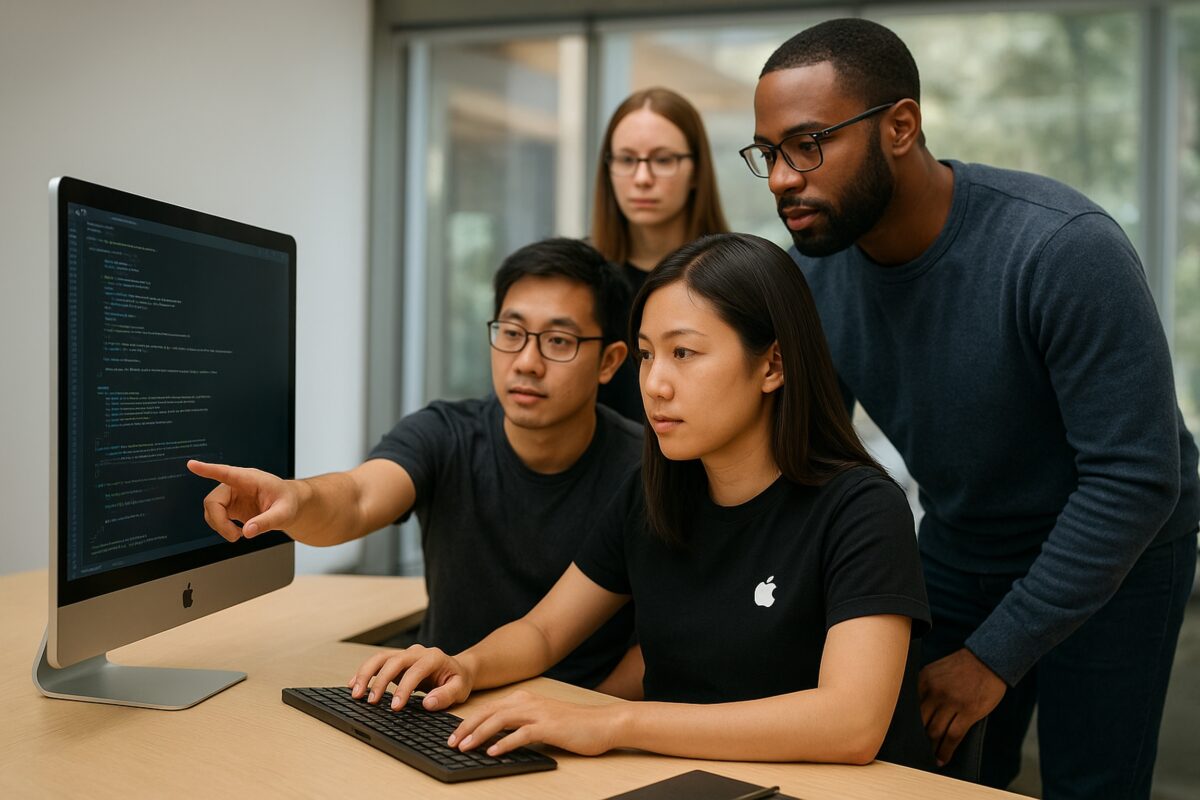Apple is one of the most selective tech companies in the world, and its interview process reflects that. If you’ve made it to the interview stage, congratulations! You’ve already stood out among thousands of applicants. But here’s the reality: technical ability alone won’t get you the offer. Apple is looking for engineers who not only write flawless SQL queries and design scalable data systems but also think strategically, solve problems creatively, and thrive in Apple’s unique culture of innovation and collaboration.
If you’re preparing for an upcoming Apple data engineer interview, you’re probably searching online for real insights: What kinds of questions does Apple ask? How difficult are the technical rounds? What’s the best way to prepare so I don’t get blindsided?
This blogpost is here to answer those questions. We’ll take a deep dive into Apple’s interview process, break down the most common Apple data engineer interview questions, and give you step-by-step strategies for preparing effectively. By the end, you’ll know exactly what to expect and how to position yourself as a strong candidate.
Understanding How Apple Conducts Interviews
Before we start looking at specific questions, it’s important to understand the structure of Apple’s hiring process. While every team is a little different — the interview for a data engineer working on Apple Music may differ from one working on iCloud — the general format is fairly consistent.
Here’s what you can expect:
1. Recruiter Screen
This is usually the first step after submitting your application or being referred by someone at Apple. A recruiter will call you to confirm your background, ask about your experience, and gauge your interest in the role. While this call won’t be deeply technical, you should be ready to talk about your key skills, projects, and why you’re excited about Apple specifically. Recruiters are looking for alignment here — if your profile doesn’t match the job description, you won’t move forward.
2. Technical Phone Screen
If you pass the recruiter screen, you’ll likely have one or two technical phone interviews. These typically focus on SQL and Python, since both are essential for Apple’s data engineers. You might be asked to solve live coding challenges on a shared doc, explain your logic, or discuss how you’d optimize queries for performance. These questions may seem straightforward at first, but Apple interviewers often push you to explain the trade-offs of your solution.
3. Onsite (Virtual or In-Person)
The onsite is the heart of Apple’s interview process. It usually involves multiple back-to-back interviews with different team members, covering a wide range of topics: data modeling, ETL pipeline design, system architecture, algorithms, and behavioral fit. Each interviewer is evaluating a specific dimension, so you’ll need to be sharp across the board. Expect whiteboarding sessions, design discussions, and case-based questions that mimic real-world Apple problems.
4. Team and Culture Fit
Apple places a strong emphasis on culture. Even if you ace the technical rounds, you won’t move forward if interviewers feel you won’t thrive in Apple’s environment. Culture questions often come last, but they’re just as important as the technical ones. Apple looks for engineers who can work cross-functionally, innovate under constraints, and handle the pressure of building products at a global scale.
Common Apple Data Engineer Interview Questions
Now let’s get into the good stuff: the actual questions you might face. While Apple doesn’t publish its interview questions (and every candidate’s experience is slightly different), patterns emerge from shared experiences of past interviewees. Below are the categories of questions Apple data engineers should prepare for, along with examples and tips for how to approach them.
1. SQL and Data Querying Questions
SQL is the bread and butter of any data engineering role, and Apple will expect you to demonstrate mastery. Don’t just brush up on basic SELECT statements because Apple’s SQL questions are designed to test your ability to work with large, complex datasets efficiently.
Sample questions you might see:
- Write a query to find the top 3 most downloaded apps in the last 30 days.
- Given a table of Apple Music streaming logs, calculate the average session duration per user.
- How would you join two massive tables (billions of rows each) without running into performance issues?
- Write a query to detect users who upgraded from a free iCloud account to a paid plan within 6 months.
What Apple is looking for:
- Accuracy (correct answers are non-negotiable).
- Efficiency (optimized queries that won’t break when scaled).
- Clarity (clean, readable SQL that other engineers could understand).
Practice on platforms like StrataScratch or Mode Analytics where you can run queries on real-world datasets. That’s far more effective than memorizing toy problems.
2. Data Modeling and ETL Design
Data modeling and pipeline design are core responsibilities of data engineers at Apple. You’ll be asked to demonstrate your ability to create schemas, design ETL workflows, and explain trade-offs in architecture decisions.
Sample questions:
- Design a schema for storing metadata about millions of photos in iCloud. Consider EXIF data, location, and file size.
- How would you build an ETL pipeline that processes daily Apple Music streams and aggregates insights for reporting?
- If you’re storing App Store purchase data, when would you denormalize your schema, and why?
- Explain how you’d partition a dataset containing billions of Siri voice commands.
What Apple is testing:
- Your ability to think about scalability and storage efficiency.
- Your understanding of normalization vs. denormalization trade-offs.
- Your practical knowledge of partitioning, indexing, and ETL best practices.
In your answers, reference real-world data engineering tools like Airflow, Kafka, or Spark. Showing familiarity with modern tooling gives interviewers confidence that you can contribute from day one.
3. Python and Scripting
While SQL is crucial, Python is equally important for Apple’s data engineers. You’ll likely be asked to write Python scripts during the interview, and you’ll be expected to explain your logic clearly.
Sample questions:
- Write a Python function to remove duplicate rows from a dataset without using built-in functions.
- How would you parse terabytes of JSON logs efficiently?
- Given a CSV with missing values, write a script to clean and standardize the data.
- Optimize a Python script that processes a large dataset but currently runs too slowly.
What interviewers look for:
- Clean, readable code with proper variable naming.
- An ability to handle large-scale data, not just small examples.
- Awareness of Python libraries (Pandas, PySpark) and when to use them.
Don’t just write a brute-force solution, always explain how you’d optimize for memory and performance.
4. System Design and Scalability
Apple operates at an enormous scale, so system design questions are a huge part of the interview. This is where you’ll need to demonstrate that you can think beyond a single database query and design entire architectures.
Sample questions:
- How would you design a system to recommend apps to millions of App Store users in real time?
- If you had to store petabytes of iMessage history, how would you design the database and retrieval system?
- Design a fault-tolerant pipeline for processing health data from Apple Watches.
- What architecture would you use to ensure real-time fraud detection in Apple Pay?
What Apple wants to see:
- A clear ability to think about distributed systems.
- Knowledge of big data frameworks (Spark, Hadoop).
- A focus on reliability, fault tolerance, and latency.
Draw diagrams when answering system design questions, and narrate your thinking. Apple interviewers want to see how you approach trade-offs (speed vs. accuracy, storage vs. cost, etc.).
5. Behavioral and Culture Questions
Finally, don’t underestimate behavioral questions. Apple wants data engineers who can communicate, collaborate, and innovate. Many strong candidates lose offers because they fail this part.
Sample questions:
- Tell me about a time you optimized an ETL pipeline that was running too slowly.
- How do you handle conflicting requirements between engineering and product teams?
- Give an example of a time you solved a data problem that had a measurable business impact.
- Describe a time when you had to push back on unrealistic expectations from stakeholders.
Use the STAR method (Situation, Task, Action, Result). Always end your story with the business impact because Apple loves to see measurable outcomes.
How to Prepare for Apple’s Data Engineer Interview
Preparation is where most candidates make or break their chances. Here’s a proven roadmap to get ready:
- Master SQL and Python. Spend daily practice time on real datasets. Don’t just memorize — understand optimization techniques.
- Review data modeling concepts. Practice designing schemas for different scenarios (e-commerce, social media, music streaming).
- Study big data frameworks. Apple uses technologies like Spark, Kafka, and Airflow — be ready to discuss them.
- Practice system design. Use mock interviews or whiteboard sessions to refine your ability to design at scale.
- Prepare behavioral stories. Write out at least 6 STAR stories covering optimization, collaboration, conflict, and innovation.
- Do mock interviews. Practicing under time pressure is the best simulation for the real thing.
Here’s How Lightforth Can Help You Pass
Interviewing for a data engineer role at Apple is tough, but it’s absolutely achievable with the right preparation. The key is to remember that Apple isn’t just testing your technical chops — they’re testing how you think, how you solve problems, and how you’d contribute to a culture that values precision, innovation, and scale.
And that’s exactly where Lightforth Interview Prep comes in.
Lightforth was built to help job seekers go beyond generic advice and practice in a way that mirrors the real interview experience. Instead of wasting hours guessing what recruiters want, you get tailored prep that focuses on:
- Real-world technical drills in SQL, Python, and data modeling, so you’re ready for the hardest questions Apple might throw at you.
- System design simulations that let you practice thinking at scale, the way Apple engineers do every day.
- Behavioral coaching that helps you craft powerful STAR stories and deliver them with confidence.
- Instant feedback so you know where to make improvements and get better with every interview practice session so you become perfect for your actual interview.
Landing a job at Apple is one of the most competitive achievements in tech. But with the right preparation, you can walk into your interview with confidence and walk out with an offer. Lightforth Interview Prep gives you the tools, structure, and feedback you need to show up as your best self when it matters most.
If you’re serious about giving yourself the best shot at acing your Apple Data Engineer interview, it’s time to stop guessing and start practicing with Lightforth.
Prepare today with Lightforth Interview Prep today and step into your interview with renewed confidence and skill.



